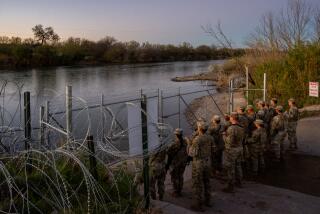A Solomon solution
President Obama’s in-house debate on troop levels in Afghanistan isn’t over yet, but it’s a safe bet what he’ll do: split the difference. Obama’s military commander, Army Gen. Stanley A. McChrystal, requested between 10,000 and 40,000 additional troops. The president appears headed toward a number in the middle.
But the number of troops, as both McChrystal and Obama have said, is not the most important thing. More important are the answers to three questions: Will U.S. goals be limited to make them more achievable? Will Obama make it clear that this troop increase is the last one the Pentagon will get? And can the U.S. succeed in nudging Afghanistan toward a more functional, less corrupt government, without which the whole enterprise will fail?
First, the mission. Last March, when he made his initial decision to increase the number of U.S. troops in Afghanistan, Obama declared what he apparently thought was “a clear and focused goal: to disrupt, dismantle and defeat Al Qaeda in Pakistan and Afghanistan, and to prevent their return to either country in the future.”
The problem was that the military’s counterinsurgency strategists took the president at his word and began planning a strategy to prevent Al Qaeda’s return to Afghanistan, which in turn meant they would have to prevent Al Qaeda’s ally, the Taliban, from controlling Afghan territory. Defeating the Taliban required a counterinsurgency campaign over most of the country. For such an ambitious mission, McChrystal’s request for 40,000 U.S. troops atop the 68,000 deployed seems too modest.
This wasn’t the only time the newly inaugurated Obama allowed his rhetoric to outrace his capabilities. Back then, Obama was promising to reform healthcare, re-engineer energy consumption and close the detention center at Guantanamo, all in his first year.
This week’s most popular word in the Obama administration, when it comes to Afghanistan, is “doable.” They’re looking to set a goal they can actually accomplish. “We needed a more focused mission statement, and that’s one thing you’ll see,” an administration official told me. McChrystal’s latest strategy is less ambitious than before: secure Afghanistan’s cities, where much of the population lives; focus the counterinsurgency on provinces where there’s a realistic prospect of reducing the Taliban to marginal status rather than fully eliminating them; and accept that parts of the country will remain beyond Kabul’s control.
The second question is the subject of hot debate at the moment: What guarantee can Obama give that this won’t be merely the first of many requests from his military command for more boots on the ground? Administration officials have been reading histories of the Vietnam War -- and shuddering at the spectacle of President Lyndon Johnson acceding to one Pentagon request after another.
Military officials bristle at that analogy; they’ve read the histories too, they point out, and insist that they don’t want the U.S. footprint in Afghanistan to grow out of control. Still, at least some administration officials are worried that this year’s request from McChrystal might be followed by more; they want Obama to make it clear that next month’s troop increase is the last he is willing to approve. This issue -- “a big issue” -- is still under discussion, they say.
Question three is perhaps the most difficult: Is it possible to forge a working partnership with Afghanistan’s civilian government? Only if it overcomes the inefficiency and corruption that have plagued it. The purpose of counterinsurgency is to help the Afghan government and security forces gain control of their own territory, but if the government isn’t capable, it won’t matter how many troops the U.S. and its allies send. That’s a problem only Afghans can solve.
Obama aides know that the Nov. 7 runoff election, if it happens, won’t turn Hamid Karzai into a beloved figure, much less end the corruption and incompetence that have allowed the Taliban to resurge. But they are hoping that the international backlash against Karzai’s attempt to steal the election -- including threats to cut off his pipeline of financial aid -- jolted the Afghan president into a commitment to serious change.
Sen. John Kerry (D-Mass.), who prodded Karzai into agreeing to the runoff last week, said he spent much of four days in the presidential palace insisting that reform had to happen -- and he thinks the message got through. “I’m confident there are going to be some changes” in Karzai’s government after the election, including replacement of corrupt provincial governors and Cabinet ministers, Kerry said. “We need to work very hard at those, because they are central to this turning around.”
But he acknowledged that the outcome of that issue is in Afghan hands, not ours.
“In 1971, I asked the [Senate] Foreign Relations Committee, ‘How do you ask a man to be the last man to die for a mistake?’ ” Thirty-eight years later, chairing the committee, Kerry said, “I keep that question very much in mind.”
--
More to Read
Get the L.A. Times Politics newsletter
Deeply reported insights into legislation, politics and policy from Sacramento, Washington and beyond. In your inbox three times per week.
You may occasionally receive promotional content from the Los Angeles Times.











